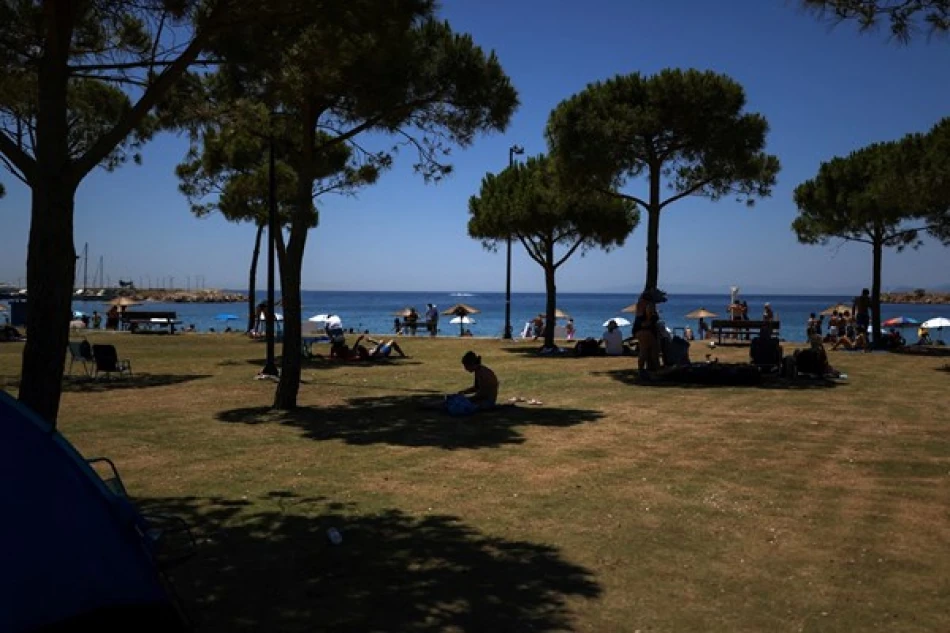
Scorching Heat Wave Grips Greece, Sparking Concerns Amid Soaring Temperatures
Greece Braces for Third Severe Heat Wave as Climate Crisis Reshapes Mediterranean Tourism
Greece's meteorological service announced Sunday that a new heat wave will grip the country for nearly the entire upcoming week, with temperatures potentially reaching 43°C (109°F). This marks the third major heat wave to hit the Mediterranean nation in just two months, signaling a troubling pattern that could fundamentally alter the region's tourism-dependent economy and force long-term adaptations in infrastructure and visitor management.
Peak Temperatures Expected Mid-Week
The latest heat wave will begin Monday and reach its peak on Tuesday, according to the Greek meteorological authority. Central regions of the country face the most extreme conditions, with temperatures climbing to 41°C (106°F), while major urban centers Athens and Thessaloniki will experience highs of 38°C (100°F).
Athens, home to over three million residents, could see temperatures spike to 40°C (104°F) on Tuesday specifically. The heat wave is expected to subside by Saturday, offering only brief respite in what has become a summer of unprecedented thermal stress.
Tourism Infrastructure Under Strain
The repeated heat waves are already forcing operational changes at Greece's most valuable tourism assets. Authorities previously reduced visiting hours at the Acropolis, Athens' crown jewel archaeological site, during the late June and early July heat waves. This precedent suggests similar restrictions may become routine rather than exceptional.
The Acropolis typically attracts over six million visitors annually, generating substantial revenue for both the Greek state and local businesses. Extended heat-related closures or restrictions could significantly impact Greece's tourism sector, which accounts for approximately 25% of the country's GDP.
Mediterranean Climate Crisis Accelerates
Greece's summer of extreme heat reflects broader climate trends affecting the entire Mediterranean basin. Spain, Italy, and Turkey have all recorded similar temperature spikes, while countries like Cyprus and Malta are implementing emergency cooling measures in public spaces.
The frequency of these events—three major heat waves in roughly eight weeks—suggests the region may be entering a new climate reality. Traditional summer tourism patterns, historically concentrated in July and August, may need fundamental restructuring as peak summer months become increasingly uncomfortable or dangerous for outdoor activities.
Economic and Infrastructure Implications
For investors and tourism operators, Greece's heat wave pattern presents both immediate risks and longer-term strategic challenges. Hotels and resorts will face increased cooling costs precisely when occupancy rates typically peak, squeezing profit margins during the industry's most crucial revenue period.
The repeated strain on electrical grids from air conditioning demand could trigger infrastructure investments, while tourism businesses may need to shift marketing strategies toward shoulder seasons—spring and autumn—when temperatures remain manageable for sightseeing and outdoor activities.
Regional Adaptation Strategies Emerge
Unlike Northern European countries still adapting to occasional heat waves, Mediterranean nations are developing systematic responses. Greece's proactive announcement and preparation for this latest heat wave demonstrates improved early warning systems, while the measured approach to tourist site management shows authorities balancing economic needs with public safety.
The challenge now lies in developing sustainable long-term strategies that preserve Greece's position as a premier Mediterranean destination while acknowledging that the climate conditions that originally made the region attractive are fundamentally changing.
Most Viewed News

 Layla Al Mansoori
Layla Al Mansoori






